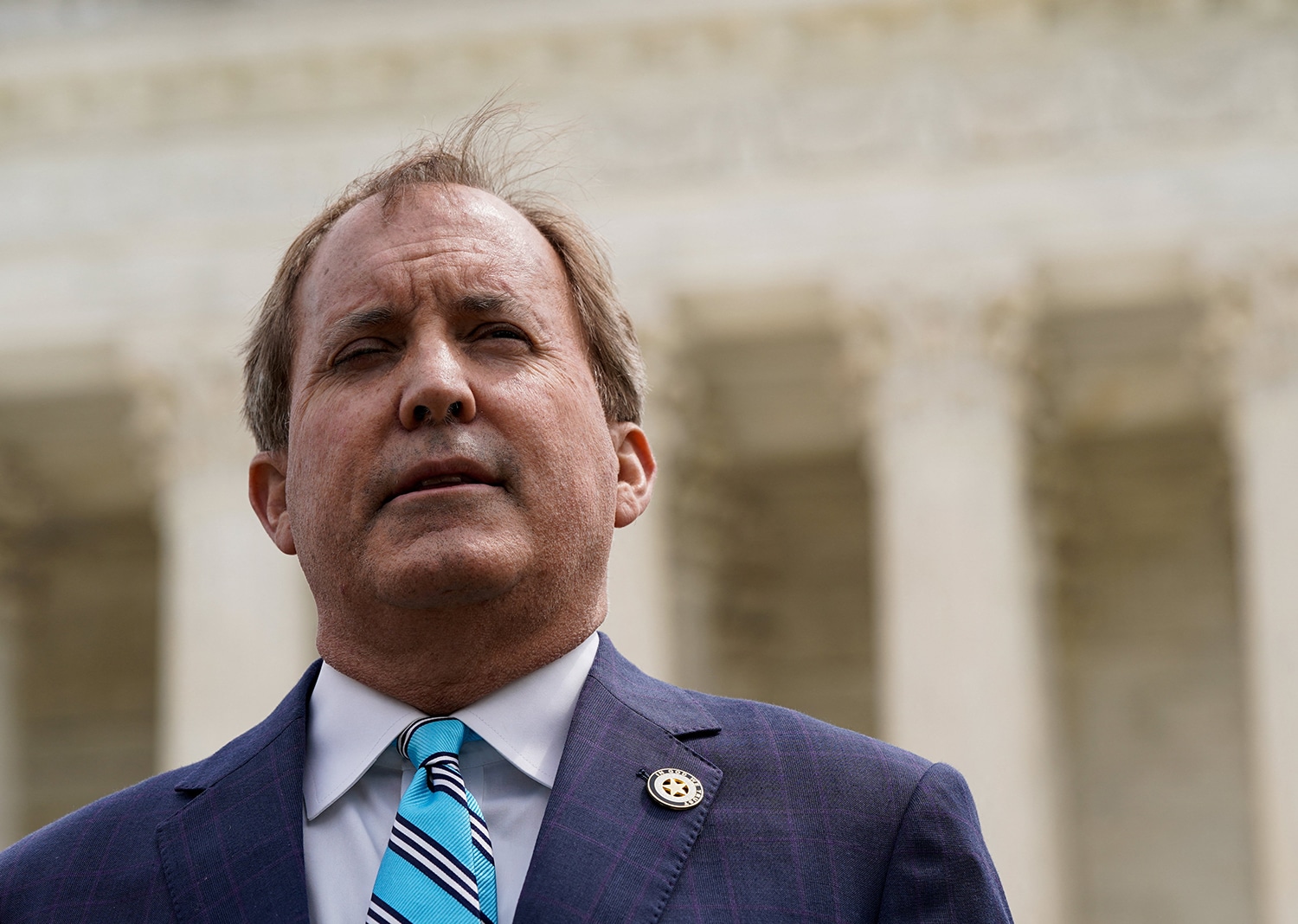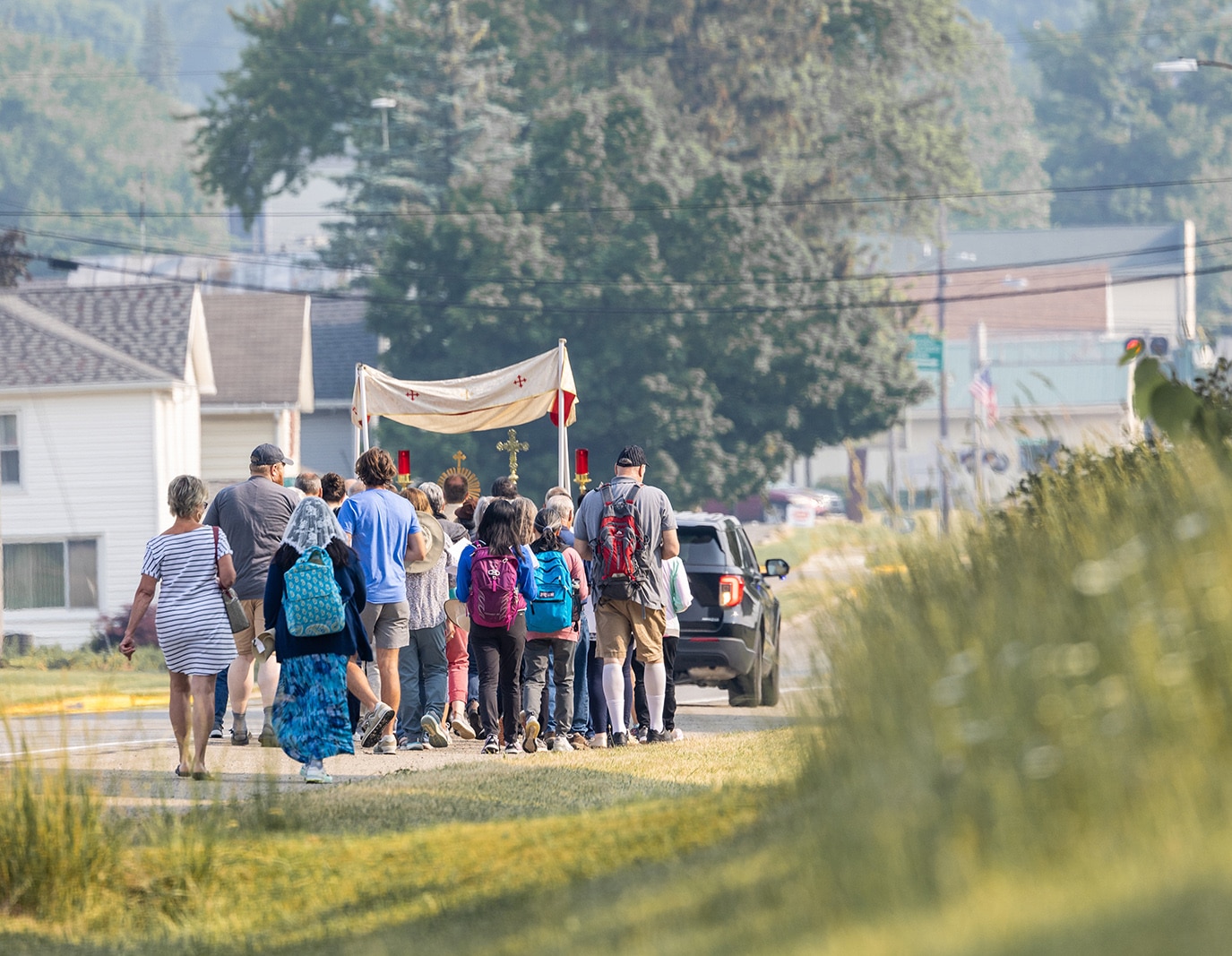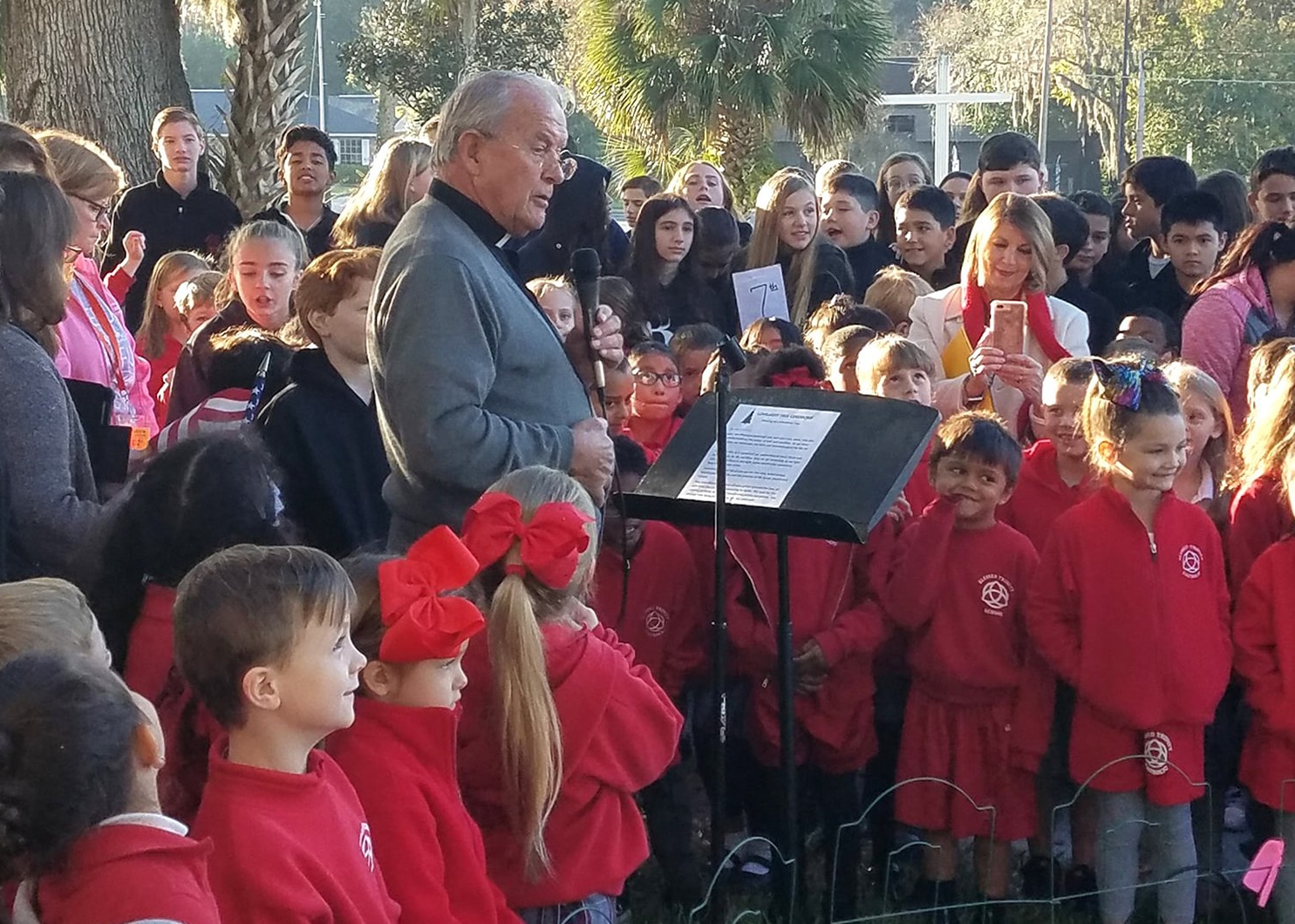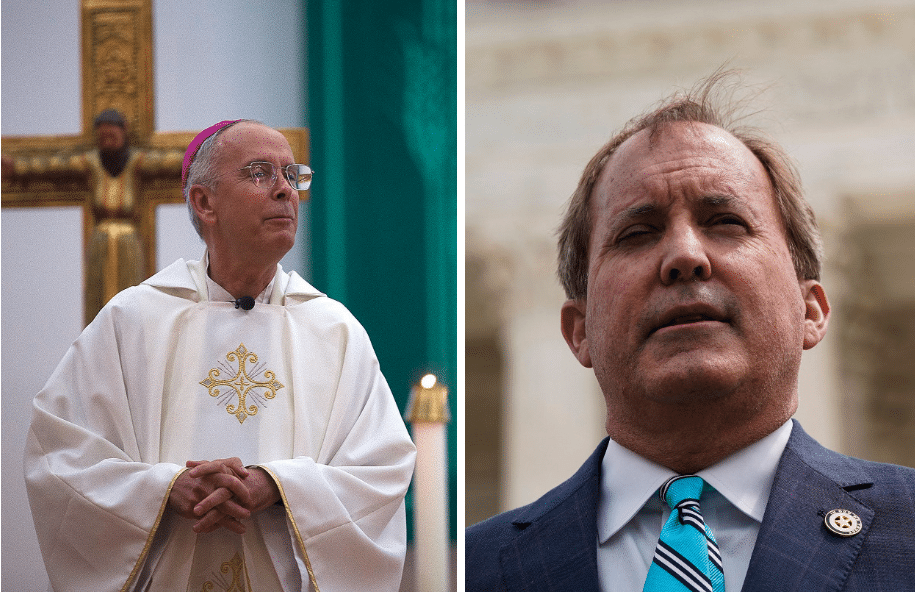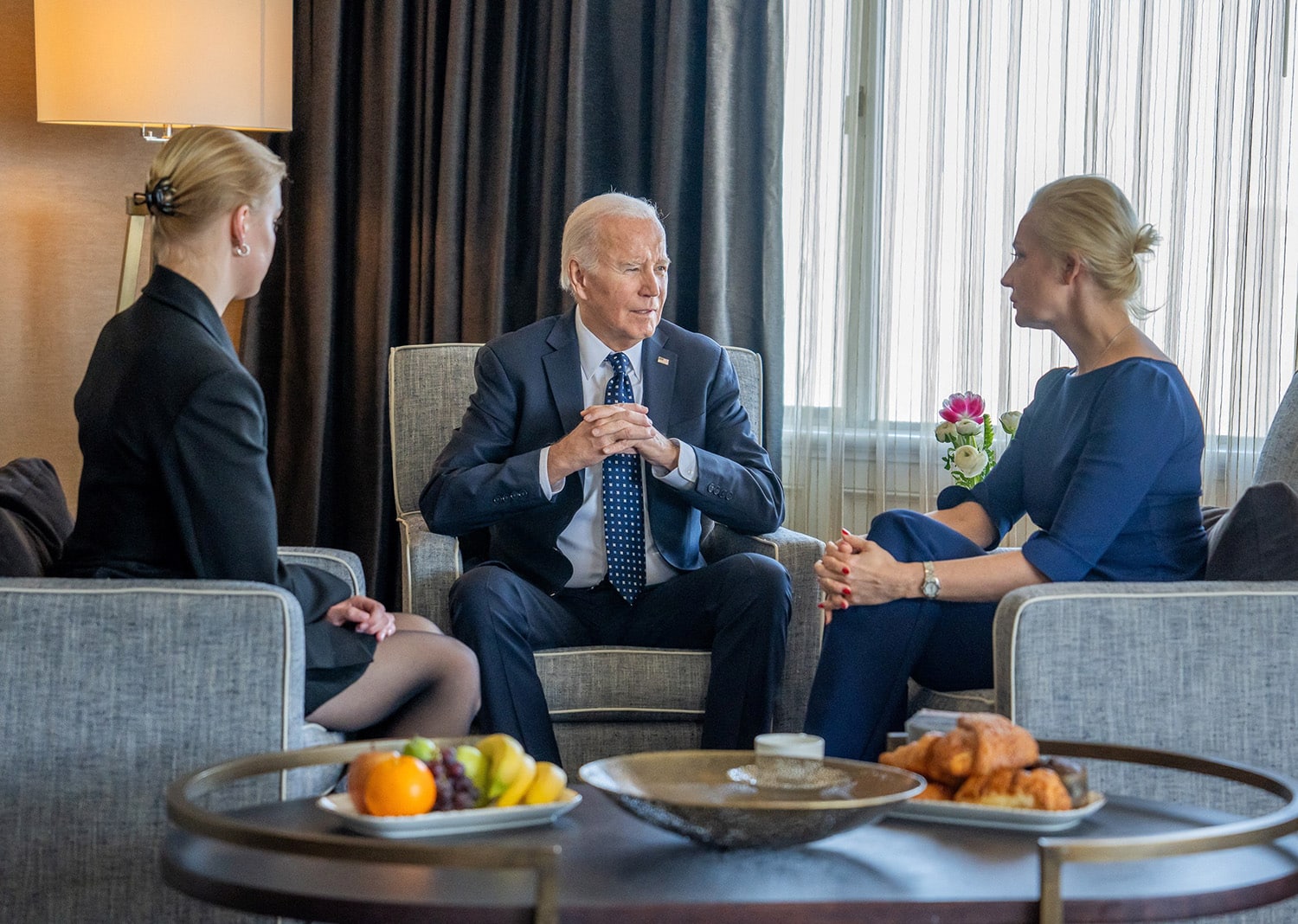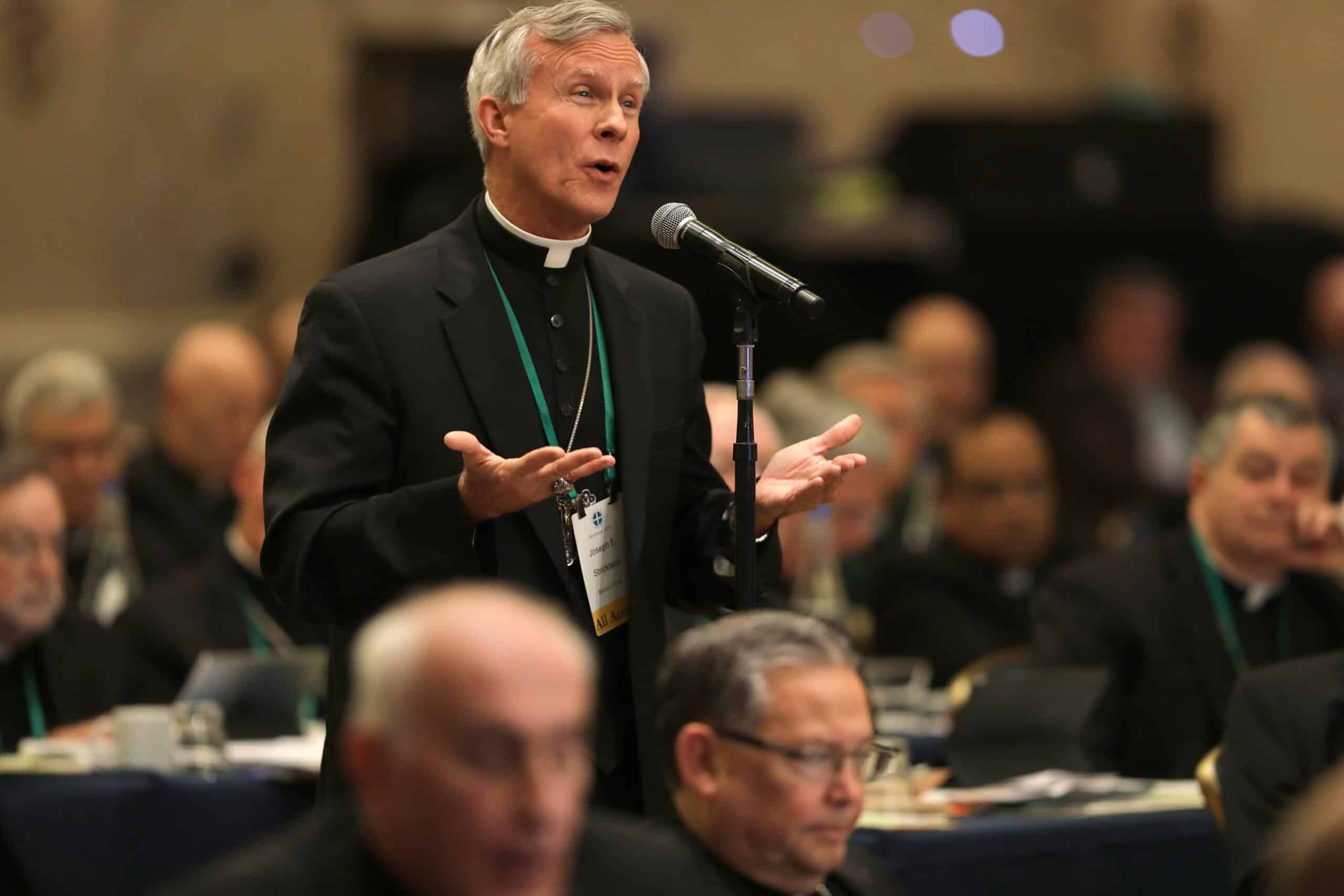(OSV News) — Texas Attorney General Ken Paxton has filed suit in an attempt to shut down a Catholic nonprofit in El Paso serving migrants and asylum-seekers, accusing it of “human smuggling,” in a move denounced by Catholic immigration advocates, including El Paso Bishop Mark J. Seitz.
“We’re taking some hits right now, you know, right to the gut on our work,” Bishop Seitz said during a Feb. 21 webinar about humane solutions for the U.S.-Mexico border hosted by the Center for Migration Studies of New York. “There’s an effort in the country to demonize the work of charity that we’re doing, as well as the search for justice. But know that we are not alone. The Lord is on our side. Don’t give up hope.”
Paxton’s suit targeting El Paso’s Annunciation House comes as some Republicans have grown increasingly hostile toward nongovernmental organizations, including Catholic ones, that provide resources such as food and shelter to migrants at the U.S.-Mexico border.
Accusation of ‘human smuggling’
Annunciation House operates several shelters in the El Paso area, assisting migrants and refugees with food, housing and other assistance, as well as information about how to fill out the required legal documents to claim asylum in the United States.
Paxton’s office said Annunciation House’s efforts amount to “facilitating illegal entry to the United States” and “human smuggling.”
“The chaos at the southern border has created an environment where NGOs, funded with taxpayer money from the Biden Administration, facilitate astonishing horrors including human smuggling,” Paxton said in a statement. “While the federal government perpetuates the lawlessness destroying this country, my office works day in and day out to hold these organizations responsible for worsening illegal immigration.”
Demand for records
In a press statement, Annunciation House said the attorney general came to the facility “on February 7, 2024 stating that the organization had one day to turn over a broad swath of records to the Attorney General without an explanation.”
“Annunciation House asked a Court to decide what documents the law permits the Attorney General to access,” the Feb. 21 statement said. “There is nothing illegal about asking a Court to decide a person’s rights.”
The group said Paxton “has now made explicit that its real goal is not records but to shut down the organization,” and that he “considers it a crime for a Catholic organization to provide shelter to refugees.”
“The Attorney General’s illegal, immoral and anti-faith position to shut down Annunciation House is unfounded,” the statement said. “Annunciation House has provided hospitality to hundreds of thousands of refugees for over forty-six years. It is a work recognized by the Catholic Church and is listed in the National Catholic Directory.
“Annunciation House has done this work of accompaniment out of the scriptural and Gospel mandate to welcome the stranger,” it continued. “Annunciation House’s response to the stranger is no different from that of the schools who enroll children of refugees, the clinics and hospitals who care for the needs of refugees, and the churches, synagogues, and mosques who welcome families to join in worship.”
Pursuing the common good
Annunciation House also argued that its work “is central to the City of El Paso.”
“El Paso has made it a point of pride to provide humane support for people coming through our community in need,” it said. “Annunciation House has kept hundreds of thousands of refugees coming through our city off the streets and given them food. The work helps serve our local businesses, our City, and immigration officials to keep people off the streets and give them a shelter while they come through our community.”
The group added, “If the work that Annunciation House conducts is illegal — so too is the work of our local hospitals, schools, and food banks.”
In a Feb. 22 statement, Bishop Seitz said, “Let me be clear. For the Church’s part, we will endeavor to work with all in pursuit of the common good of our city and nation.”
“We will vigorously defend the freedom of people of faith and goodwill to put deeply held religious convictions into practice,” Bishop Seitz said. “We will not be intimidated in our work to serve Jesus Christ in our sisters and brothers fleeing danger and seeking to keep their families together. We will stand in solidarity with our communities, aid workers and volunteers, with our community nonprofits assisting migrants, as well as with all those in the Borderlands and throughout our state living under the weight of inhumane immigration policies.”
Bishop Seitz, who also is the U.S. bishops’ migration committee chair, added in his statement that El Paso has worked to foster a welcoming community, but “today, however, we find ourselves in an impossible position hemmed in on all sides.”
“On the one hand, we are challenged by serious federal neglect to provide a safe, orderly and humane response to migration at our southern border,” he said. “On the other hand, we are now witnessing an escalating campaign of intimidation, fear and dehumanization in the state of Texas, one characterized by barbed wire, harsh new laws penalizing the act of seeking safety at our border, and targeting those who would offer aid as a response of faith.”
A local response to a ‘broken’ system
Since its beginnings in 1976, Annunciation House “has been an effective, compassionate, local response to a complex and broken immigration system, rooted in the Gospel and born of an encounter between (founder and director) Ruben Garcia and Mother Teresa of Kolkata,” Bishop Seitz said.
“It has led our community effort to meet the challenge of migration in recent years. Its work is nourished by long-standing partnerships with the Catholic Church and El Paso, our local government and our federal law enforcement partners, including U.S. Border Patrol,” the prelate said. “Its work is an example of our Catholic commitment to the poor, the Christian call to love one’s neighbor and stepping into the breach to take action where many will not. Our church, our city and our country owe Annunciation House a deep debt of gratitude.”
At the Feb. 21 webinar, panelists joined Bishop Seitz in condemning Paxton’s effort to shut down Annunciation House. Dylan Corbett, executive director of the Hope Border Institute, a group that works to apply the perspective of Catholic social teaching in policy and practice to the U.S.-Mexico border region, said “faith-based organizations in particular have been picking up the pieces of a broken system for decades.”
Catholic organizations ‘not the enemy’
Paxton’s effort, Corbett said, is “a threat.”
“This is a shot across the bow,” he said. “It’s an action designed for political effect. It’s an action designed to have a chilling effect.”
J. Kevin Appleby, senior fellow for policy at the Center for Migration Studies of New York and the former director of migration policy for the U.S. Conference of Catholic Bishops, said at the webinar that Paxton was “shameless.”
“The Catholic Church organizations coordinate with the federal government, help the federal government do their job, responding to migrants who cross the border,” Appleby said. “They’re not the enemy. And to go down this road can start persecuting faith-based organizations in order to make political points is wrongheaded. We’ve seen this throughout history, where you know, Catholics, Christians, Jews, Muslims, all faiths have served their mission in assisting others who were in need. And to attack that for political points is just shameful.”
Rep. Veronica Escobar, D-Texas, who represents a district that includes El Paso, issued a statement calling Annunciation House a “critical faith-based partner” and Paxton’s effort “outrageous.”
“If Mr. Paxton believes that Annunciation House merits investigation, he should apply that same standard to Gov. Greg Abbott, who has literally transported a similar population across state lines,” Escobar said in reference to the Republican governor’s record of busing migrants to Democratic-led jurisdictions.

